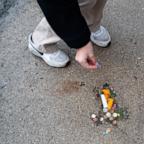Syrian Mother Speaks of Her Son Sold Into Battle
The trafficking of young men as soldiers is on the rise.
— -- Human trafficking rings have flourished since the start of the Syrian conflict, with children and other victims being sold across borders into Lebanon, Egypt and other Arab countries. Some children are trafficked for sex or labor – and increasingly others, namely young men, driven into battle.
In 2010, the year before the conflict began, Lebanon's Internal Security Force recorded eight trafficking victims. By 2013 the number rose to 27, with 24 traffickers convicted. Many more cases go undocumented.
Umm Omar, 35, is the mother of one of the victims. Originally from Talbesa, a suburb of Homs, she saw her husband killed and her family home destroyed by shelling. Eighteen months ago she fled to Egypt with her boys, ages 16 and 10. Her older son, Mohammad, had suffered second-degree burns when the mortar hit their house.
What Happens If US Troops Run Into the Iranian Military in Iraq?
Troops Surrounded, Trapped in Iraq's Key Refinery
Obama To Send Up To 300 U.S. Military Advisers To Iraq
Once she arrived in Egypt she was befriended and eventually duped by a fellow woman from Homs who said she would take Mohammed to Turkey for better medical care. Instead the woman sold him into servitude, to a rebel fighting brigade. Analysts say the practice is common now in Syria, even among moderate opposition groups.
"Depraved groups take advantage of people to grow their child trafficking rings," said Umm Omar. "Parents often lose their children because of their naïveté, turning children, the ultimate symbol of peace, to a new tool of war in Syria."
A U.N. report says that in February 2013, "Syrian government forces seized children under 18 years old at checkpoints, and government-affiliated militia used sectarian affiliation, kinship systems and cash to fill their ranks. These methods may have led to the recruitment of child soldiers. Children were also used as informers; government, government-affiliated and opposition forces punished "informants" with judicial or extrajudicial execution. It also reported the deaths of 17 children fighting for the Free Syrian Army.
Below is our conversation with Umm Omar, describing her ordeal:
I have many relatives and friends here, and the cost of living in Egypt is low compared to the cost of living in Lebanon or Turkey.
I used to receive some food and monetary aid from UNHCR. I had a small monthly paycheck for $100, but that’s only after they saw my injured son, who needs constant treatment, and my youngest son who has to go school. I used to receive some assistance from charities responsible for helping Syrians or from other people we know.
At that point a woman I'll call F.K., also from Homs, started visiting me to help me after she heard about my situation. She was the cousin of a man who used to work at a store we owned, so I trusted her.
She seemed happy to have bumped into me. She helped me several times as she has a large network of connections. This relationship lasted for several months, when she would visit me and help me out.
When she learned about my son’s medical condition, she made me an offer. She suggested I send my son to Turkey where a U.N. official responsible for following up on Syrian refugees would receive him. She said the official would pay all of the expenses and as soon as my son recovers, he would either be brought back or I would be given a plane ticket to go and live with him there. Our current situation doesn’t allow us to travel together.




